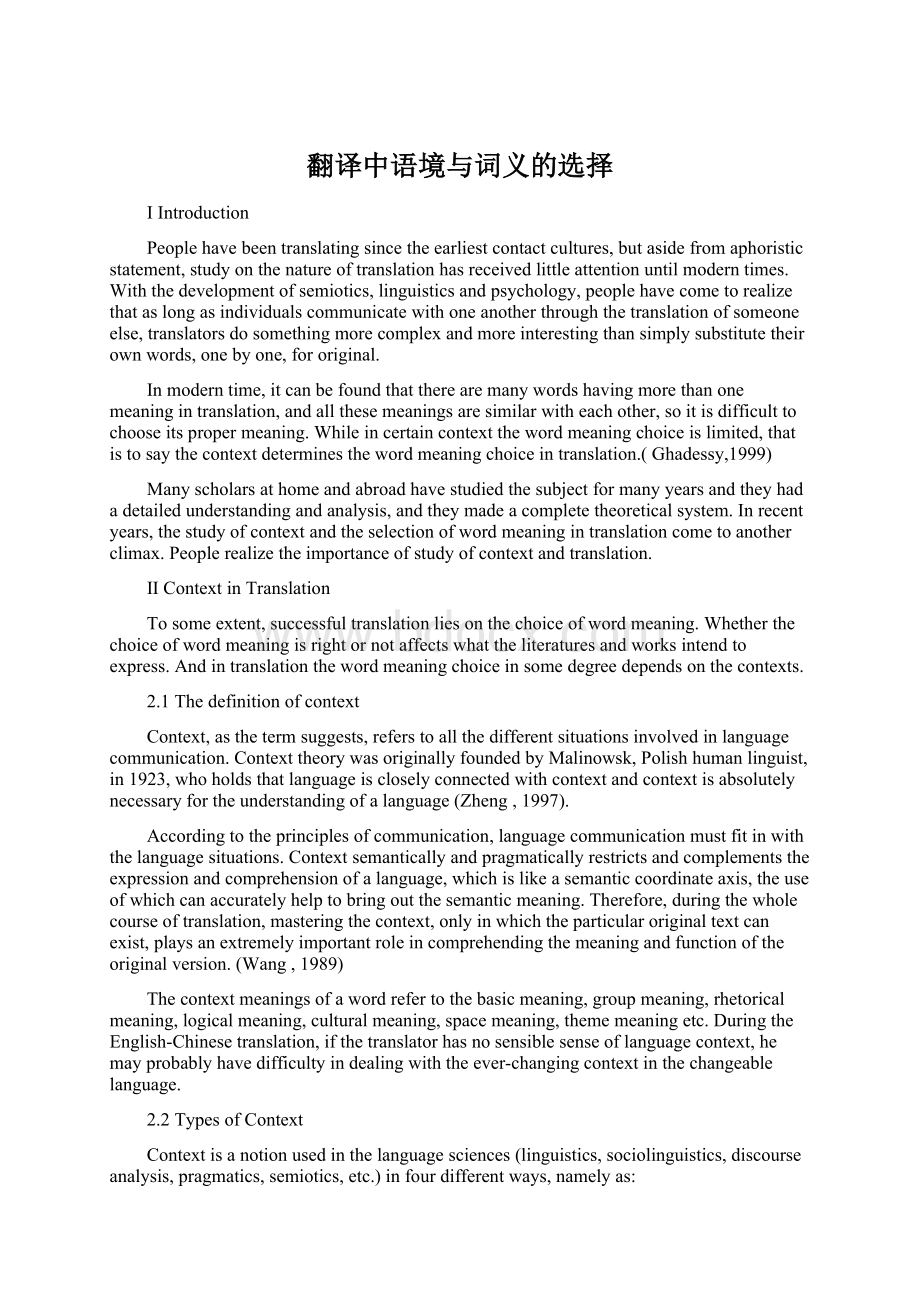翻译中语境与词义的选择文档格式.docx
《翻译中语境与词义的选择文档格式.docx》由会员分享,可在线阅读,更多相关《翻译中语境与词义的选择文档格式.docx(11页珍藏版)》请在冰豆网上搜索。

Accordingtotheprinciplesofcommunication,languagecommunicationmustfitinwiththelanguagesituations.Contextsemanticallyandpragmaticallyrestrictsandcomplementstheexpressionandcomprehensionofalanguage,whichislikeasemanticcoordinateaxis,theuseofwhichcanaccuratelyhelptobringoutthesemanticmeaning.Therefore,duringthewholecourseoftranslation,masteringthecontext,onlyinwhichtheparticularoriginaltextcanexist,playsanextremelyimportantroleincomprehendingthemeaningandfunctionoftheoriginalversion.(Wang,1989)
Thecontextmeaningsofawordrefertothebasicmeaning,groupmeaning,rhetoricalmeaning,logicalmeaning,culturalmeaning,spacemeaning,thememeaningetc.DuringtheEnglish-Chinesetranslation,ifthetranslatorhasnosensiblesenseoflanguagecontext,hemayprobablyhavedifficultyindealingwiththeever-changingcontextinthechangeablelanguage.
2.2TypesofContext
Contextisanotionusedinthelanguagesciences(linguistics,sociolinguistics,discourseanalysis,pragmatics,semiotics,etc.)infourdifferentways,namelyas:
∙verbalcontext
∙timecontext
∙placecontext
∙originatorcontext
2.2.1VerbalContext
Verbalcontext,classifiedasbroadandnarrowverbalcontext,referstotherelationshipamongwords,phrases,sentencesorsectionsandchapters.Ittakesgreateffortstounderstandthespecificmeaningsoflanguageelementssuchaswordsandphrases.Narrowverbalcontextmeanstherelationofspecificlanguageelementsthroughthewholetext.
SincepolysemyiscommoninEnglishincludingmanyphenomenathatthesamewordsorphrasesmayhaveoppositemeaningsindifferentcontexts,knowingwellofnarrowverbalcontextwillhelptranslatorstogetridofambiguity.Let'
sseetheexamples:
Example
(1):
Ineverhadmuchinseeingyou.Therewasnolovelostbetweenusatanytime,Ithink.(C.Dickens:
MartinChuzzlewit,2000)
Example
(2):
…wegrumblealittlenowandthen,tobesure.Butthere'
snolovelostbetweenus.(O.Goldsmith:
SheStoopstoConquer,1773)
Fromtheaboveexamples,wecanseebothofthetwoexampleshavethesamesentence“there’snolovelostbetweenus.”Isolatedfromthespecificverbalcontext,thissentencehastwocompletelydifferentinterpretationsbecauseofthespecialmeaningsoftheword“lost”,namely“我们之间毫无感情“或”我们之间依然相亲相爱”.However,thissentenceappearsinthespecificverbalcontext,themeaningsofthesamesentenceareobviouslyoppositebecauseoftherestrictionoftheverbalcontext.
Trytocomparethenexttwointerpretations.
Translationofexample
(1):
我向来不大想看到你,咱们俩人之间大概什么时候都不曾有过好感。
(《综合英语成语词典》)
Translationofexample
(2):
…当然唠,我们有时也免不了争论几句,但是我们还是相亲相爱的。
(Fan,1994)
Broadverbalcontextreferstothesemanticrelationshipsofthewholeparagraph,chapterandeventhewholebookwiththesemanticrelationofcertainlanguageelements.Becausethiskindofrelationshipcoversrelativelywidespaceandtime,itisoftenignoredbytranslators.Forexample,theninthchapterofSisterCarriealsohasthesentence“there'
snolovelostbetweenus”,andonekindoftranslatedversion“他们还可以说是恩爱夫妻”doesn'
tobviouslytallywiththecontext.Intheoriginaltext,thissentenceisusedtodescribetherelationship,whichisseeminglyinharmonybutactuallyatvariancebetweenthehotelmanagerHurstwoodandhiswife.Soitshouldbetranslatedto“他们之间毫无爱情可言”.Ifthetranslatorofthisbookhadhadawell-thought-outplan,hewouldnothavemadesuchamistake.
2.2.2TimeContext
Timecontext,asonefactorofcontext,isthetimewhencommunicationhappens,whichalsofallsintotwotypes,broadandnarrowtimecontexts.Thenarrowtimecontextreferstothespecifictimeoftheutterance.Thesamesentencealwayshasdifferentmeaningsindifferenttime.Forexample:
Example(3):
Hepassedawaylastautumn.
Ifthissentenceissaidinthewinter,itshouldbetranslatedinto“他是在今年秋天去世的”,whileithappensintheautumnorsummer,“他是在去年秋天去世的”isthecorrecttranslation.
Broadtimecontextreferstothetimeandhistoricalbackgroundinwhichtheutterancehappens.Sincelanguagedevelopswiththedevelopmentofthesociety,andchangesasthesocietychanges,thesamewordsorphrasesmaybeendowedwithdifferentconnotationsindistincttimes.(Schiffrin,2006)Forexample,inthetimesofChaucer,“women”aregenerallycalled“wife”whileatpresent“wife”isthetechnicaltermof“妻子”;
InthetimesofShakespeare,“deer”isgenerallyknownas“animal”while“deer”means“鹿”inparticular;
Intheworksofearlynineteenthcentury,“pen”shouldbetranslatedinto“鹅毛笔”not“钢笔”and“cab”shouldbetranslatedinto“出租马车”not“出租汽车”.Thusitcanbeseenthatthebroadtimecontextalsoplaysstrongrestrictionsonthemeaningofwordsandphrases,therefore,wemustnotmisinterpretwordsthroughtakingthemtooliterally.
2.2.3PlaceContext
Placecontext,onefactorofcontext,referstotheplacewheretheutterancehappens.Undermostcircumstances,meaningsofutterancehavecloserelationshipwithspecificsites.Let'
sseesomeexamples:
Example(4):
Attention!
“Attention!
”means“注意”intheairportloungewhileinthedrillground“Attention!
”means“立正”.
Example(5):
It'
stimetogoaboard.
Translation
(1):
该上车了。
Translation
(2):
该上飞机了。
Apparently,ifthissentenceisheardinastation,itmeans“该上车了”andinaairport,weshouldchoose“该上飞机了”.
Itcanbeseenthatsometimesthemeaningsofwords,phrasesandsentencesdependoncertainspecificsituationsandsuchsituationalmeaningswidelyspreadinEnglish,therefore,weshouldpaygreatattentiontothem.(Talmy,2005,176)
2.2.4OriginatorContext
Originator,namely,istheauthororspeakerhimself.Asfarastheworkisconcerned,lifeexperience,thoughtandcharacteristicsoftheauthorirrevocablyhaveimpactonthetrendandstyleofhisworks.Asfortheconversationsbetweenthecharactersoftheworks,thespeaker'
sidentity,socialstatus,physiologyandmentalityalsohavelimitationsontheuseoflanguage,sointhewholecourseofinterpretation,translatorsshouldhavedeepresearchontheoriginator.Let'
sseethenextexamplestoillustratethispoint.
InBernardShaw'
sfamousdrama“Pygmalion”,duetotheinstructionofalinguist,SaintJoanwithfullmouthofdialectturnsintoayoungladytalkingingoodtaste.YangXianyi,acelebratedtranslator,suitablygraspthedifferentstateofmindandabilityoflanguageexpressionoftheflowergirlindifferentstagesofherlife.
Example(6):
Nahthen,Freddy:
lookwhereyougoin,death.
Sincethissentenceissaidbeforereceivingthelanguagetraining,andwhattheflowergirlsaysisvulgarandnonstandard,thetranslatordoeswelltochooseearthyspokenlanguagetointerpretit.Let'
sseethetranslation.
Translation:
你这是怎么的,佛莱第,你走路不长眼哪。
Example(7):
Theshadowdepressioninthewestoftheseislandsislikelytomoveslowlyinaneasterlydirection.Therearenoindicationsofanygreatchangeinthebarometricalsituation.
Translation:
英伦三岛以西的轻微低气压大约要慢慢向东移动了。
从气压看来还没有天气巨大变化的迹象。
Thereisnodoubtthattheflowergirlhasbeenreceivingthelanguagetraining,butsheisstillnotproficientinexpression.Duringthetrivialgossipabouttheweather,wecannothelplaughingthattheflowergirlhassuchaninappropriatetalkpayingexcessiveattentiontowording.Therefore,theauthortakesadvantageofstylevariationinsteadoftherigidliterarystylesothattheinterpretationvividlyrespondstheeffectoftheoriginaltext.
Example(8):
“Howdoyoudo,ProfessorHiggins?
Areyouquitewell…Butofcourseyouare:
youareneverill.Sogladtoseeyouagain,ColonelPickering.Quitechillythismorning,isn'
tit?
”(Shaw,Pygmalion,1916)
您好,息金斯教授。
您身体好吧?
……当然您身体一定很好;
您是从来不生病的。
很高兴看见您.辟克林上校。
今天的天气很凉呢,不是吗?
Aftersix-monthlanguagetraining,theflowergirlhasbeenabletospeaki